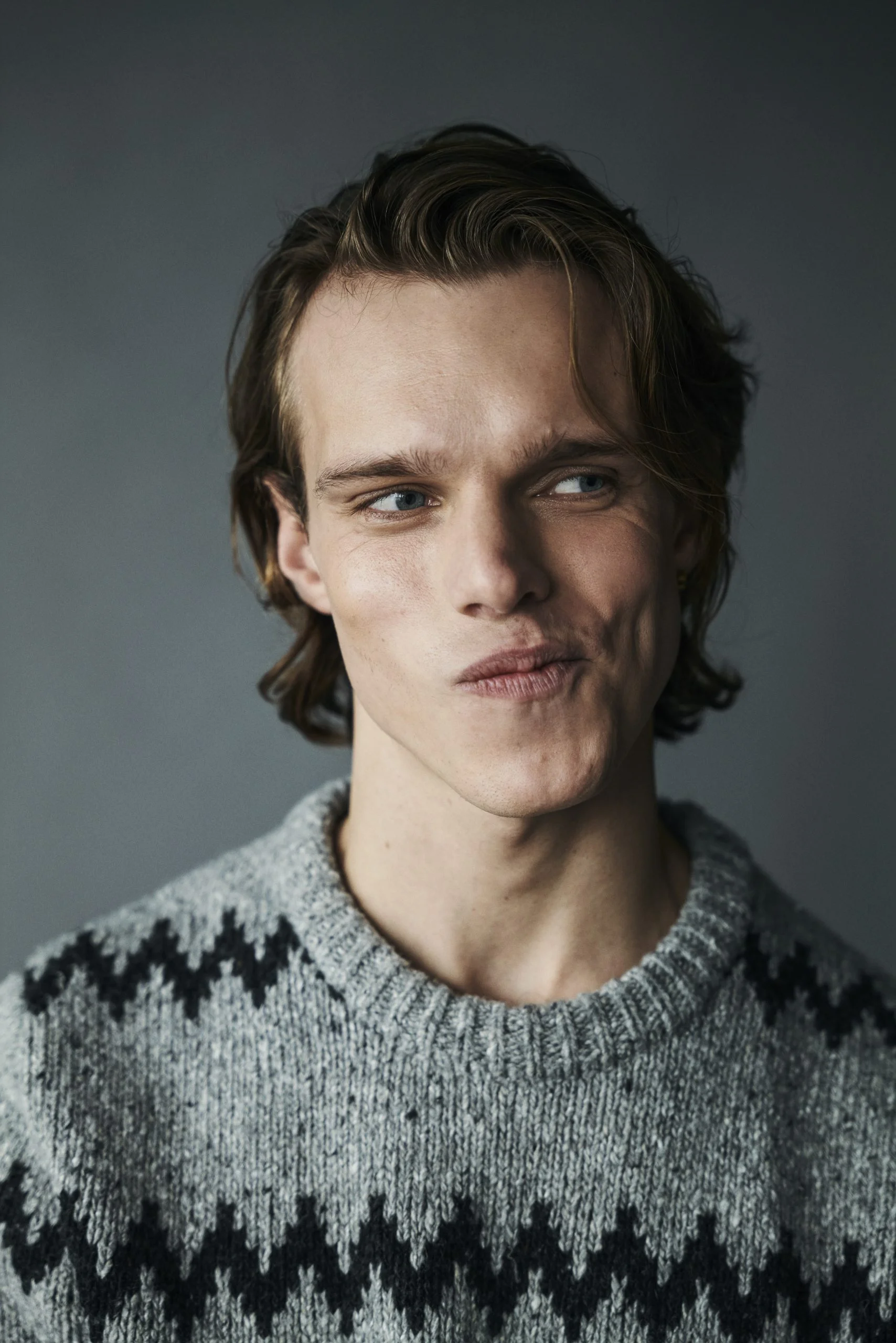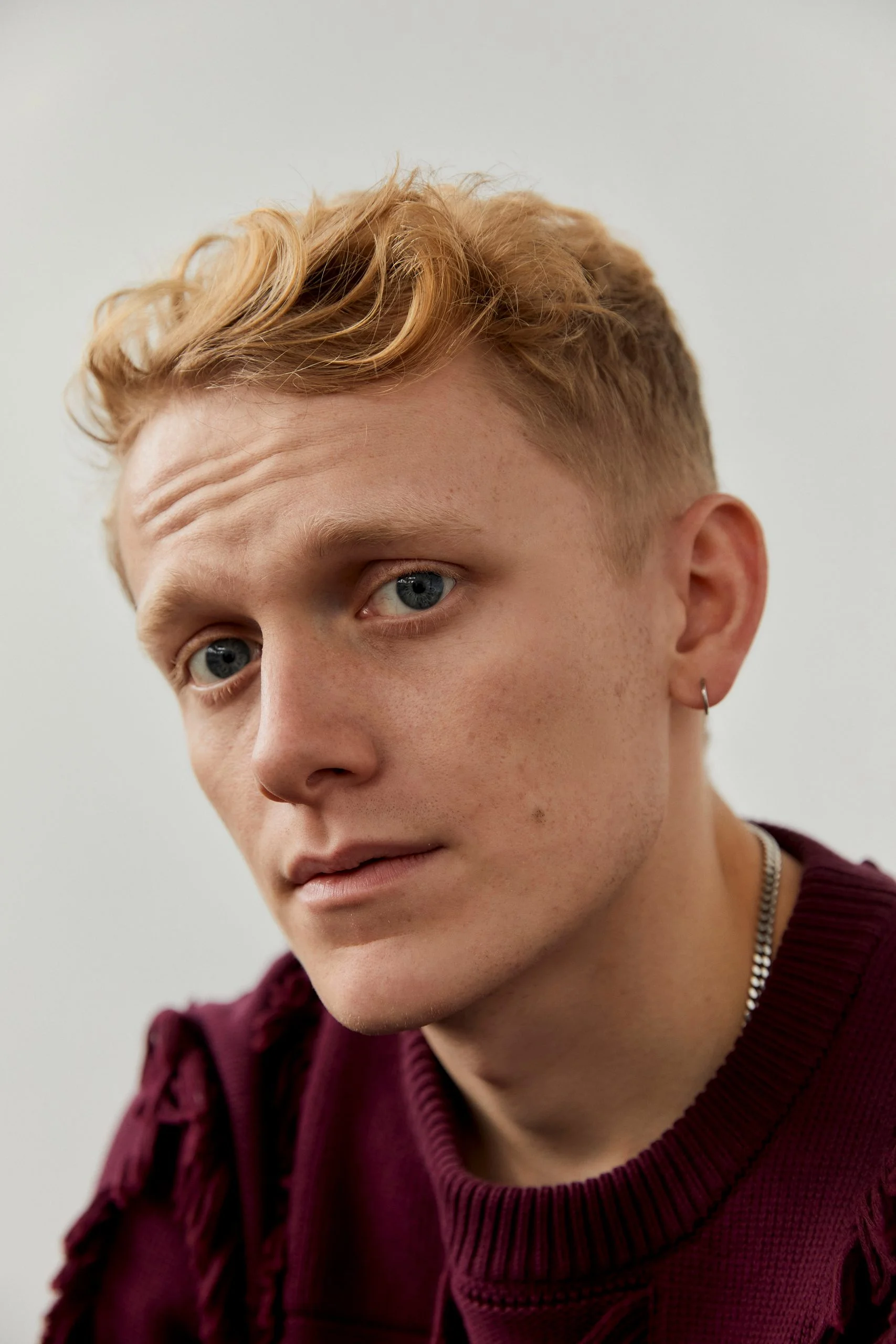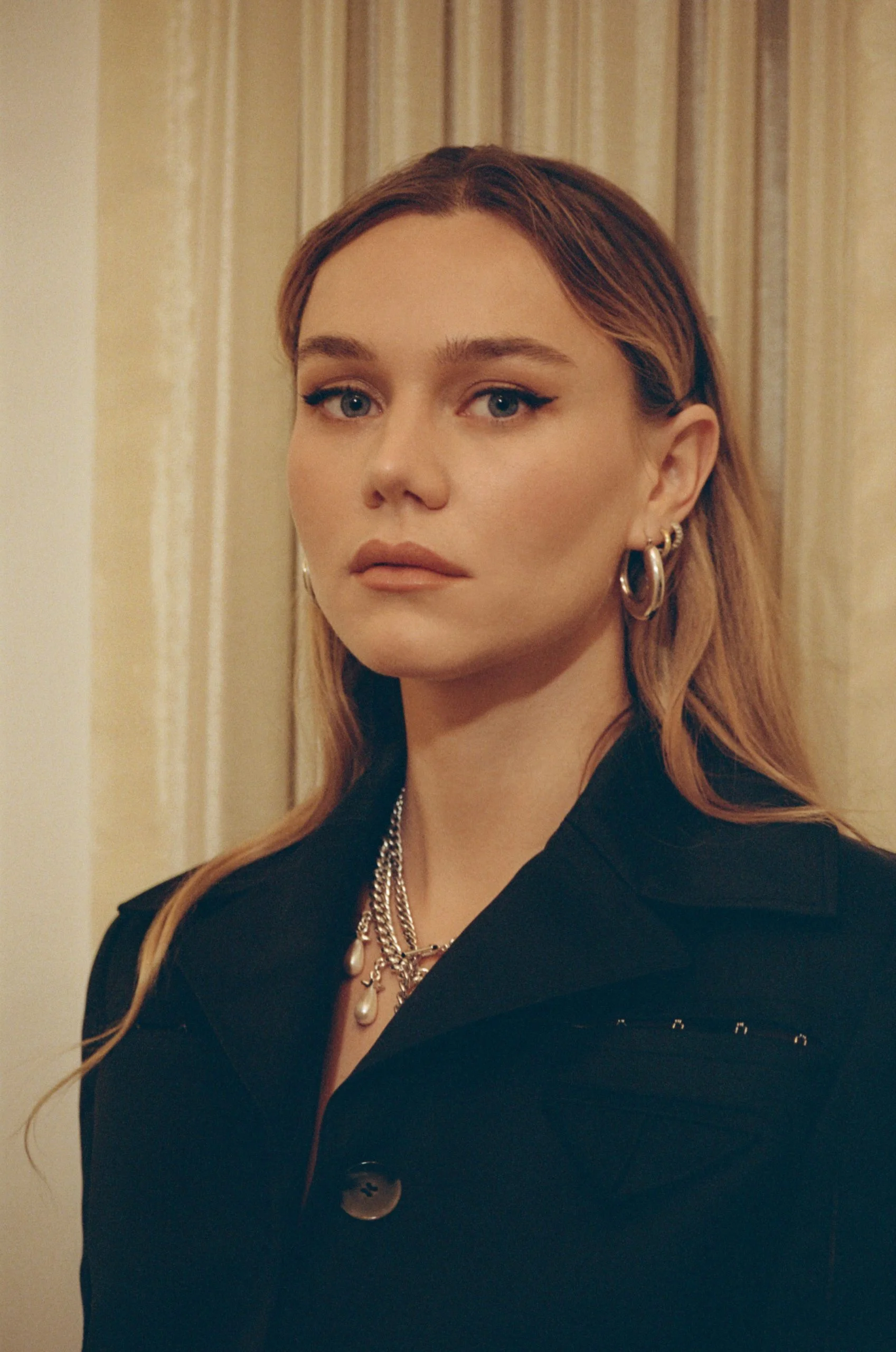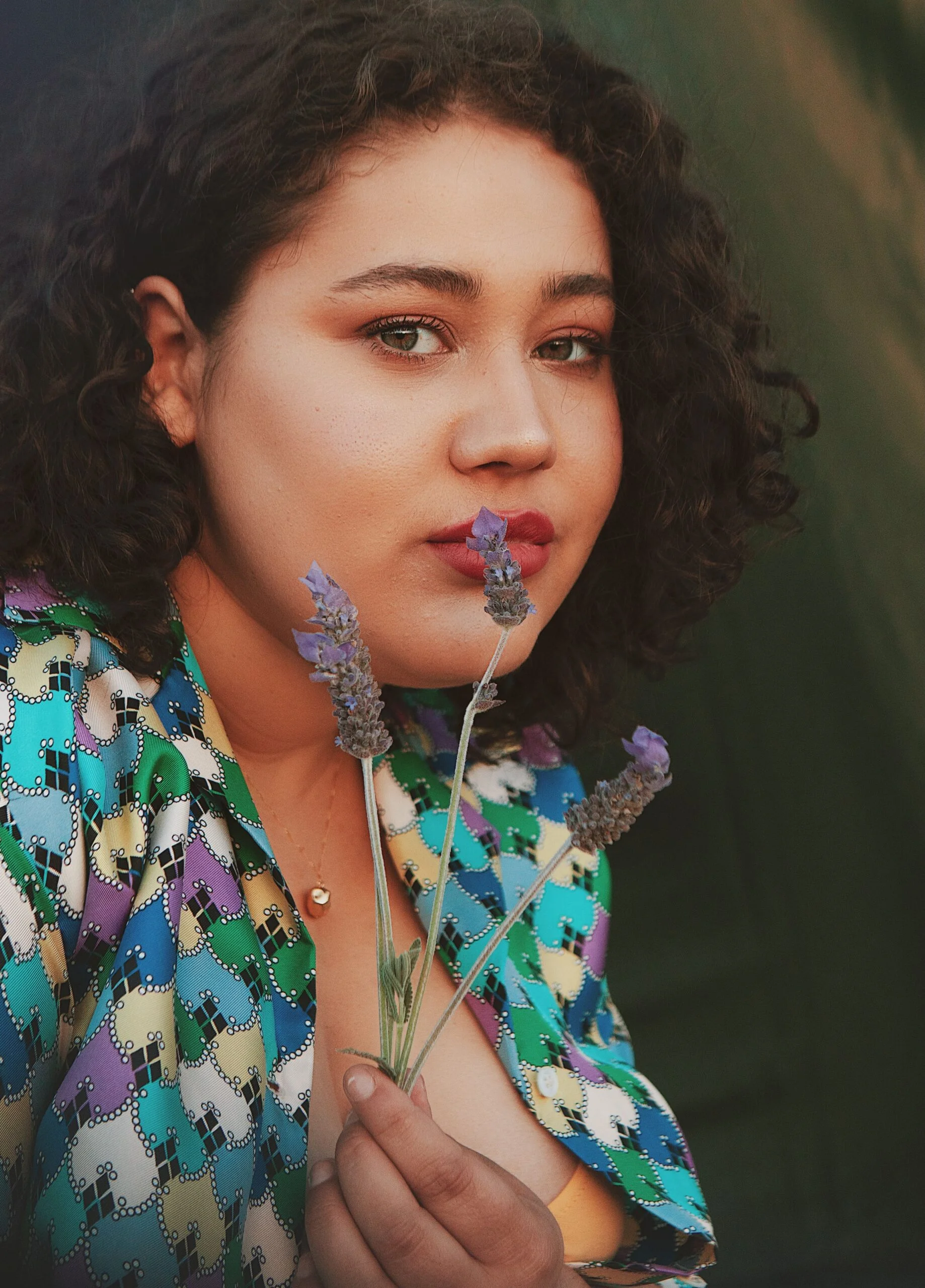
Odette
With her compelling and groundbreaking sophomore record ‘Herald’, Australian musician Odette navigates growing up, trauma, and learning to soothe anger in her own way.
After the 2018 release of her debut record ‘To A Stranger,’ Australian musician Odette returns with ‘Herald’, a poetic force of a record that blends Odette’s own inner world with the outside universe. Now, one may ask what the ‘outside universe’ means when compared to someone’s inner world, but the word ‘herald’ means “a person or thing viewed as a sign that something is about to happen” and throughout the record, Odette can sense that something outside of her is coming. Juxtaposing her own internal imagery and experiences against the environment outside of her by using insect noises, atmospheric sounds, and evocative lyrics throughout her record serve as a reminder to everyone that despite the trauma and turmoil, there is an entire world to explore outside of our own, sometimes difficult, bubble.
In conversation with 1883, Odette speaks about her new record ‘Herald’, understanding and navigating her BPD diagnosis, and why we need to be better at empathy and understanding rather than focusing on ‘trauma Olympics’.

blazer and skirt Maggie Marilyn bra NICO necklace Brie Leon
It’s been a few years since the 2018 release of your debut record ‘To A Stranger’. How do you think you’ve grown as a singer/songwriter and just as a regular human being between then and now?
Oh goodness, a lot has changed. It’s hard to pinpoint exactly, everything just feels different. I’ve grown up a bit since my first record. I was quite young when I wrote and recorded that and my perception was that of a 16-year old, which was very drama-oriented and immersed in whatever narrative I was living at the time. Now, I feel more connected to the world. I find that my writing is more diverse in the sense that it’s more inclusive of general concepts and imagery rather than a specific narrative.
Yeah, like writing from a more universal place rather than making it completely about you.
Totally. ‘Herald’, the record that just came out, is still sort of akin to being stuck in a narrative but that was more on purpose on this record. I wanted to draw attention to that rather than getting lost in it. It was, in a way, for me to remain objective by dramatizing and hamming it up. I feel like my writing now, even after this new record, is touching on things that don’t necessarily have anything to do with me which is quite nice.
The album is called ‘Herald’ and the album opens with that track — what was it about that song in particular that made you want to name the album after it? You were leaning towards naming it ‘Dwell’ at one point.
I found that calling it that would be reaffirming a lot of negativity and keeping me in that weird headspace. I’ll be performing these songs for the next year or two so I wanted to make sure it wasn’t just, oh I’m so sad! Oh, I’m so stuck in this place! Because I’m not anymore. To keep singing the same sort of song about being damaged isn’t healthy, so I wanted to encompass who I was and who I’m becoming in one album. The word ‘Herald’ does that because it talks about the first-person narrative of rage, loss, and grief at the end of a relationship, but everything around the lyrics has nothing to do with pain. There are insect noises, bird noises, and all of these other aspects on the record that serve as a reminder that there is a bigger world outside of this story. Calling it ‘Herald’ has summed that up for me. Despite everything going on, there’s an entire universe out there to explore. Herald as a word means something is coming and I wanted to do that.
It’s like stepping outside and looking at it from a bird’s eye view rather than being an actual character.
Yes! It’s like in high school when you learn macro/micro — you’re stepping outside of the personal view and looking at things more objectively and how it relates to society and the general environment.
Although there’s some pretty heavy imagery throughout the record, the lyric “I’ll face my fears even if damn kills me/And I’ll stand as strong as an ox in an alley” is so powerful and optimistic even if the song weaves through some darker imagery. Are you someone who considers songwriting as a form of therapy in a way?
I definitely would say that. I think it’s a way for me to figure things out. I’ll be honest: I don’t understand most things most of the time. I’m sort of in my headspace, so it’s important for me to slow down and make sense of things in my way. This record was me acknowledging a negative time in my life and then not quite knowing how to get there. I always feel like my writing is like putting on different glasses and trying things out to figure things out. Then, by writing this music, it starts to make sense to me. I give it context, I understand how I’m feeling within that context, and I learn to navigate it.
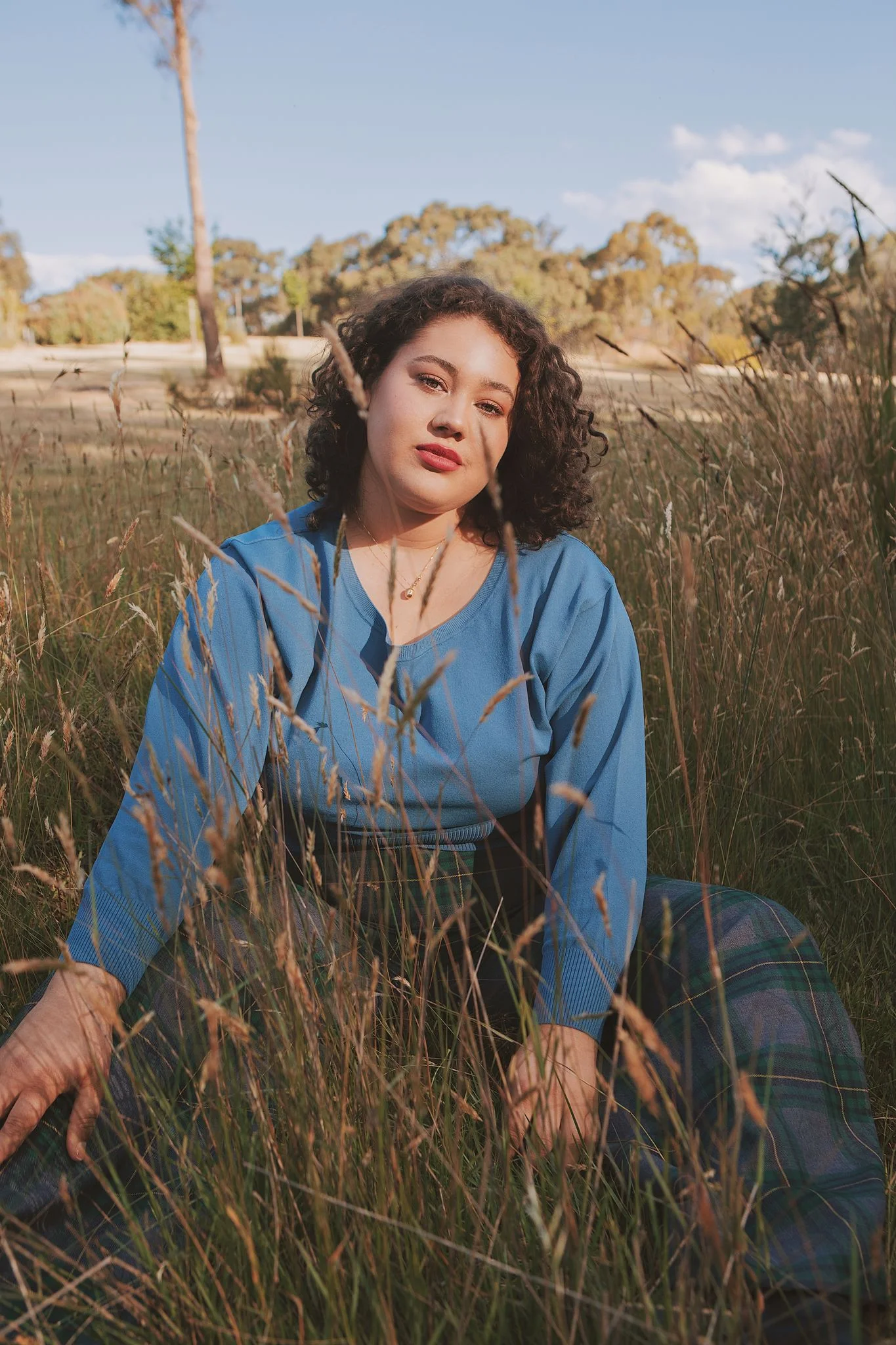
jumper Scanlan & Theodore pants Anna Cordell necklace Brie Leon
The chorus and bridge of ‘Dwell’ is something that resonated with me — “Feel like I haven’t come home yet/But I convince myself/ It’s just temporary heartache.” and “This different person, jagged smile/That loved and lost and over time/Had dwindled to a dwelling sigh/And now I wonder who am I?” I feel like the word ‘Dwell’ alone carries so much weight. What was it like writing that song?
That one, in particular, was a co-write between me and a couple of other writers. We were having a fun time and it’s a sort of homage to Twin Peaks. After a while, Pip and I decided to take this and run with it. Sometimes you do a demo and nothing happens but I think we both felt something special with that song. We took it to Melbourne where we worked on it for a couple of days and it took a new form. The song completely changed and I realized it was going to be one of my most personal and honest songs. I wasn’t ready when I listened to it.
I wasn’t ready when I listened to it! It floored me.
I’m sorry! [Laughs] A core part of who I am has this incredible impatience. This is going to sound kind of wacky, but sometimes I feel like in my day-to-day life it’s very easy to pander to the immediate context and not exactly say what I’m feeling or thinking. A lot of my songs come across as really intense because stuff has been bottled up over time and my brain says you can’t keep lying! You physically cannot keep lying! Write the song! And that’s what ‘Dwell’ was. It was like coming out of fog after we finished it. Pip is a really lovely human and he allowed the space for me to go through whatever I was going through which meant I was understood on an emotional and creative level which is always important when you’re exploring your feelings through music. It was intense but a great process.
I can only imagine. Even reading those lyrics and listening to the song made me feel like I was going through a fog. Something I admire about you is your openness even when it’s difficult. You shared a poignant and heartfelt post on Instagram a few weeks ago where you discuss quitting trauma. I spent some time going through the comments and I found them so welcoming and warm. Is it ever difficult for you to be open like that on social media or do you find it cathartic to an extent?
Thank you for saying that. I don’t know, all these things I say usually are in the heat of the moment and I think oh, I can’t delete that because it’s already out there! And I feel that, alone, is overwhelming. I do share quite a lot and I’m still trying to find the balance between sharing enough and oversharing. I’m still trying to figure out what it means to be a functioning human being. Talking about trauma is always difficult because you have to sort of approach it from a gentle perspective but you also need to acknowledge the intensity of it. It’s hard, especially because in this new age you want to make sure your language doesn’t vilify other people in the process. I’m sharing less at the moment purely because I’m not 100% sure how to talk about these things.
I’m sure it’s hard to feel like you must speak on things too, especially when it involves your trauma that you’re going through. You don’t owe anyone anything, in a way.
That’s something I’ve struggled with because I’ve always felt like I do owe people an explanation as to why I am the way I am. It’s that thing people will always make a trope out of in a woman — she’s the quirky girl, she’s just weird. A lot of the time people just don’t understand that the quirkiness and humour come from a place of wanting to create a comfortable social environment because most of the time I feel very uncomfortable. I like to be on my own, I’m a very insular person even if I’m extroverted as hell. I’m scared to talk about these things but I’m still going to do it because whatever I can contribute will hopefully help. There’s so much research that needs to be done and so much stigma that needs to be overcome, so if I can play a small part in helping that then I hopefully will have done something right.

blazer and skirt Maggie Marilyn bra NICO necklace Brie Leon
Listening to the record represents a journey of self-reflection, grappling with trauma, and learning how to grow. I know before you started writing this record before you were diagnosed with borderline personality disorder — I read that you feel like ‘Herald’ is like a duet between your past and present self. What was it like having this body of work that was representing a part of you that you were still working through after your diagnosis?
I still find it quite difficult to listen to myself in that period. There was so much negativity and maladaptive coping and behaviour that makes it difficult for me to listen to. I feel like I’ve grown so much since then and I’m not going to lie, revisiting everything for this album campaign has been very, very hard. It’s like revisiting and embodying a person I don’t like. Whilst I love the songs and I’m glad I paid homage to what happened, it’s like performing a caricature of that time. Sometimes it feels liberating and sometimes it feels not completely right. I have a weird relationship with this record because it’s so deeply personal and because I was undiagnosed. It’s like I can feel the confusion behind it. I can come across as someone with very strong convictions, a lot of the time that’s on purpose because I don’t have many. This album is very much me trying to figure out my brain and how it connects to the environment.
BPD isn’t talked about much in music — typically it’s only anxiety and depression. Your music video for ‘Herald’ shows your experience of BPD, the scenes I found most interesting were the ones where you’re pulling down the sheets and smashing the hammer to the wall to let light in. Was the video concept something you came up with?
My creative pal Peter Hume came up with the original concept but it evolved. I had a lot of ideas during the shoot so a lot of the shots were my creative input. Everything focuses around the three points—the pulling of the plastic, the dancing and rioting around, and the smashing of the eyes. The smashing of the eyes is the most important shot to me because it’s me rejecting the experience and paying homage to how I feel now which is… I need to get the fuck away from the whole thing and the intensity of it all. I think everyone who has BPD or a complex mental illness will experience something like that. It’s this self-awareness where you’re asking yourself why things are happening, why are your interpersonal relationships so rocky, and it’s somewhat of a self-rejection. It can be quite violent and brutal internally, but it leads to growth. You have options, there are ways to learn how to behave and act that align with who you are. It’s hard to come to that conclusion and that’s what the music video is about.
‘Trial By Fire’ has multiple verses before a chorus which I feel isn’t a typical song structure in music today. I read that you wrote it about your complex relationship with your parents and as someone who also has a complex relationship with her parents, I resonated with some of the lyrics. I like that you’re somewhat breathlessly saying all of these verses, trying to get everything off your chest, which I think as kids we keep a lot inside and don’t confront our parents a lot. Was that a conscious decision in regards to the lyrics or did it just suit the structure of the song?
I don’t put a lot of thought into it. It’s more of an instinct rather than a conscious decision. Usually, my songs that are more lyrically dense are written during some sort of dissociative state where it’s just happening. I just couldn’t even think—there was just so much to say and I just needed to spill the beans so to speak. I just wrote it without really thinking too hard and afterwards, I just felt like…. Well shit.
That’s how I felt when I listened to it.
A lot of people go through their childhood trauma and internalize things. I internalized a lot but I was extremely loud and would always talk back. I was the problem child in school, but I was also really smart so they didn’t know what to do with me. Now, because I was so extroverted and loud about it, I’m trying to refine what I’m saying, take out the rage, and soothe the anger. Kids who don’t feel heard often shut down and I felt like I woke up in conflict. It was like I was so aware of what was happening that I would sit my parents down and tell them what they were doing wrong and how we could move forward. Because of that constant clarity of the situation being consistently rejected, I sort of became depleted. I’ve always loved words and communication and feeling connected, so to grow up in a household that had a performative aspect of that dulled me. This song is about the anger that comes with the consistent invalidation of pain. But, like every song on this record that touches on something traumatic, this song has elements of comfort to me. This song samples one of my favourite Ravel piano pieces because it is so intense. I need beauty to offset the pain of what I’m talking about. All of the aspects and elements of that song are things I would associate with joy which is so funny because I just talked about how intense the song is, but it’s true!
It just sounds like you’re trying to give the listener a form of hope. I don’t want to say you’re glamourizing pain or anything, but there is an optimistic spin on it.
I think that’s completely normal. You look at artists like Halsey and she romanticized her pain. A lot of people will think that’s annoying and agitating, but I respect it. She has her way of coping with pain the best way they can. I’m tired of the emotional hierarchy and trauma Olympics people are placing on others. No one deals with trauma perfectly, they just deal with it in their way. You should be called out for bad behaviour. I’ve been called out for my bad behaviour. You just hope to be met with empathy and understanding rather than complete judgement.
Speaking of empathy, I feel like there is so much build-up to an album — you’re working for years on it while learning about yourself and working on yourself. Now that it’s been out for a few weeks, how are you doing?
I’m okay. I was bad at the beginning of the year and then my album came out and I was worse. I felt like it was not what I needed. When you’re going through something intense, you don’t want attention on you at all and then my album came out and it was very badly timed! Everyone was asking if I was excited and I didn’t feel like I could process any of it. I just wanted to lock my door and tend to my plants and hug my dog, which is horrible because I’m so grateful to everyone who worked on it. It was just hard when I was in that headspace. Now, I’m at a point where I needed to feel that… shame, in a way, so I could overcome that feeling and still do what I’m doing now. I think I feel proud of myself.
And you should—you released a whole album.
My brain figures things out in a weird way, but I’m trying to feel proud of myself. I’m so proud of the people I work with. I am proud of the music but because I disassociate a lot, sometimes I forget where I’m headed. Listening back to this record was like, Oh, right, all that stuff happened. It’s a bit overwhelming, but it motivates me to make the art. I want to move on from this trauma and I’m glad I put it out because if I didn’t, I would still be writing about it.
Lastly, what do you hope people take from this record after they are done listening to it?
I’ve been asked before and I just sort of bullshit the answer.
You can bullshit to me, that’s fine.
No, I’m going to try to answer it. I want people to know that there is a space for them if what they are feeling isn’t quite acceptable. There’s a place for people like me, and like anyone else, who is different and doesn’t feel like they get it. I want them to know there are ways to cope and that I freaking get it—it’s tough out there. I want people to feel validated if they have intense emotions and feel like they have a community rather than just being the token quirky girl. There’s a whole community of people who are loud and don’t know when to stop and if those people can relate to this record, then I’m happy.
To learn more about borderline personality disorder, please visit:
Mental Health America
SANE Australia
Mind UK
Check out Odette’s new album ‘Herald’ out now!
Interview by Kelsey Barnes
Photographer Laura Du Ve
Stylist Emily Gibb
Top image credits
dress Ginger & Smart
necklace Brie Leon



